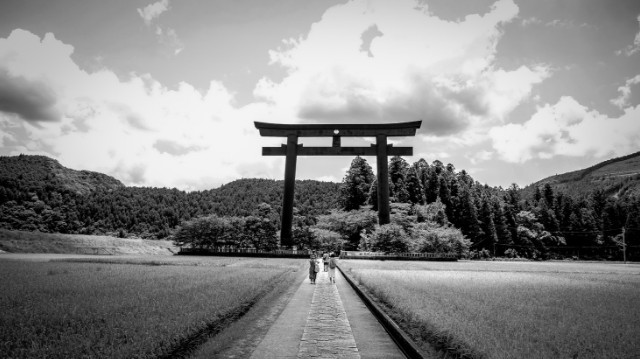Today we’re going to cover a couple of ways to say “where are you from” in Japanese, so that you can begin to use this common phrase in your interactions with Japanese people.
This is both a great line to use when opening up a new conversation with someone, and it’s also a nice way to keep the ball rolling when you’ve been talking about other things, and feel like it’s time to change the topic.
The good thing is that by asking a lot of questions, you are able to control the direction of the conversation.
However, in order to understand all of the things that the other person says, you will need to expand your vocabulary.
That’s largely something that you’ll have to do on your own, but I figured that I would add in a couple of example sentences near the end to help you out.
The Basic Way To Ask
The most common way to ask someone in Japanese where they are from is with the below phrase.
- どこから来ましたか? (doko kara kimashita ka?)
- Where are you from?
Let’s break down each of the word in detail so that you can fully understand them.
The first word is どこ (doko) which means “where” in Japanese, and is one that you will no doubt use a lot when speaking and listening.
The next word is から (kara) which is actually a particle in Japanese that can potentially have many different meanings depending on the context of how it is used.
In this sentence is means “from” and you can see how it attaches to the end of どこ to form どこから which literally translates as “where from” in English.
The next word is 来ました which is the polite, past-tense form of the verb “to come” in Japanese.
Finally we have another particle, this time か (ka) which is used as a spoken question mark.
So here’s a list of each word:
- どこ – where
- から – from
- 来ました – came
- か – ?
The Japanese language can be tricky like this, where the word order is almost the exact opposite as it is in English, and certain things are left out of the sentence entirely (the word “you” isn’t in there!)
I think a natural way to translate どこから来ましたか into English would be like “where did (you) come from?” when asked to the person you’re talking with.
Now the interesting thing about Japanese is how you can say the exact same thing, but change the wording to make it more formal or casual.
For example, in order to make it casual you can change it to どこから来たの (doko kara kita no).
But to make it more formal you have to use some new words which we will cover in the next section.
A More Formal Version Of The Question
Let’s say that you are at a Japanese event where everyone is dressed up formally and enjoying a high class dinner.
In these types of situations, or when you at a super important business meeting, you will probably want to use the respectful and humble forms of the language in order to speak appropriately.
This phrase will change from the one we saw above to this new form.
- どちらからいらっしゃいましたか? (dochira kara irassha imashita ka?)
- Where are you from (formal)?
As you can see, the two particles in the phrase have remained the same so let’s just look at the two words that changed.
The first one is どちら (dochira) which is a polite way to say “where” in Japanese, rather than the normal どこ from the first sentence.
The other word that changed is いらっしゃいました (irassha imashita) which is actually kind of a confusing word because it has three meanings that are all different!
It can be used to mean all three of the following:
- to come
- to go
- to be
Obviously, within the context of the example sentence above, it functions as the word for “to come” but unless you are paying close attention while listening, it can be easy to get them mixed up.
If I had to make up an English equivalent phrase for どちらからいらっしゃいましたか, then I would probably go with “From whence do you hail, good sir.”
And I would imagine that it’s being asked by a gentlemanly lord at a ball.
Perhaps I just have a vivid imagination though!
How To Ask Where Someone Originates From
There is actually another word that commonly gets used when asking a person what their hometown, or country is.
The word is 出身 (shusshin) and it simply means “a person’s origin” in Japanese.
The phrase that it’s often used in is pretty simple, and it may actually be the easiest one to learn out of the three in this article.
- どこ出身ですか? (doko shusshin desu ka?)
- Where are you from, originally?
The other new word here is です (desu) which can be understood to mean “is” in this sentence if we reword the English translation a little to “where is your hometown?”
The word です is actually pretty common in Japanese and sometimes is only added to make a sentence polite, but isn’t actually needed to add any significant meaning to it.
If you’d like to learn more about it, then you can read about it here.
A Couple Of Example Sentences
This section isn’t really necessary for you to read in order to understand today’s lesson, but I thought that it could be helpful in illustrating a conversation about where someone is from.
ENGLISH
- Where are you from?
- I’m from Nara.
- Oh, really? That’s a beautiful place.
JAPANESE
- どちらからですか? (dochira kara desu ka?)
- 奈良からです。 (nara kara desu.)
- あ、そうですか?美しいです。 (a, sō desu ka? utsukushii desu.)
Just in case you were wondering, yes I did add in yet another way to ask someone where they are from. What you will find is that, like most languages, there are many different ways to ask the same thing in Japanese.
It’s best to get familiar with several of them because you never know which one someone else is going to use on YOU.
ENGLISH
- Have you been to Kobe?
- I haven’t been there yet… However, I would like to go.
- Well then, you should go!
JAPANESE
- 神戸に行きましたか? (kōbe ni ikimashita ka?)
- あそこにまだ行きません… けれども、行きたいです。 (asoko ni mada ikimasen… keredomo, ikitai desu.)
- それでは、行くべきです! (sore dewa, iku beki desu!)
There are so many Japanese towns, cities, wards, prefectures, and more! I would advise you spend a little time researching the names of a couple places that you think you would like to visit, so that you can talk about them in conversation.
Now Start Using What You’re Learned
You now know how to ask people where there are from, and you can do so in a variety of ways that range from casual to polite, and even ultra formal!
One of the best ways to help memorize these phrases is to practice using them yourself in meaningful situations, such as when you are talking to someone in Japanese.
But even it you’re not ready to do that just yet, you can always practice saying it yourself as if you were doing both sides of the conversations.
Now I’d love to hear from you!
Leave your questions and comments down below and I’ll be sure to get back to you!
Further Resources for Learning Japanese:
#3 Get My eBook (Secrets to Learning Japanese) for Free

またね!
